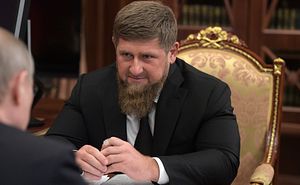On September 4, 2017, Chechnya’s leader, Ramzan Kadyrov, held a rally in Grozny that mobilized tens of thousands of Chechens against Myanmar’s repression of Rohingya Muslims. In his speech to protesting Chechens, Kadyrov described the ongoing violence against the Rohingya as “a Holocaust against Myanmar’s Muslim community.”
The demonstrations in Grozny gained international attention as they followed Kadyrov’s release of an Instagram video on September 2 that scathingly rebuked the Russian government for supplying arms to the Burmese military. In the Instagram video, Kadyrov urged Russia to intervene militarily in Myanmar to protect the rights of Rohingya and threatened a breach in Chechnya’s relationship with Moscow if Russian President Vladimir Putin did not express opposition to Myanmar’s Rohingya crackdown.
Even though Chechnya’s ability to unilaterally shape events in Myanmar is virtually nonexistent, Kadyrov’s expressions of solidarity with the Rohingya could eventually prompt a change in Russian policy toward Myanmar. The prospect of Russia distancing itself from Myanmar’s government over Chechen unrest is a realistic one for three reasons.
First, mass attendance at the pro-Rohingya rally in Grozny signifies deep-seated discontent within Russia’s Muslim community about Moscow’s resolute support for the Burmese military. Even though Kadyrov’s bombastic claims that 1.1 million Chechens joined his demonstration are clearly a fabrication, as Chechnya’s population is only 1.4 million, the Rohingya crisis has mobilized Russian Muslims into uncharacteristically large demonstrations.
The presence of an estimated 30,000 protesters in Chechnya, hundreds of demonstrators outside Myanmar’s embassy to Moscow, and isolated rallies in Dagestan highlight the extent of the solidarity between Russian Muslims and their Burmese counterparts.
The Russian state media’s unwillingness to criticize Myanmar’s repression of the Rohingya could result in these demonstrations boiling over into religious violence. Concerns about retributory violence have risen substantially since Kadyrov warned on Instagram that he would be willing to “go against Russia” if Moscow continues to back the Burmese military. The sense of alarm generated from these threats is especially palpable as Russian policymakers did not expect their Myanmar policy to have such a strong backlash in Chechnya.
Even though Russia is unlikely to appease Kadyrov by abandoning its arms contracts with Myanmar, Moscow could assuage outraged Russian Muslims by applying diplomatic pressure on Myanmar’s State Counsellor and de facto leader Aung San Suu Kyi to halt the Burmese military’s human rights abuses. Achieving tangible progress toward this goal through diplomatic engagement with Yangon would defuse the potential Islamist threat emanating from Chechnya and highlight Russia’s arbitration prowess in the Asia-Pacific region.
Second, Chechnya’s adoption of similar views to Saudi Arabia on the Rohingya crisis could encourage Russia to distance itself from Myanmar’s government, as Kremlin policymakers want to counter the growing alignment between Grozny and Riyadh. Since November 2016, Kadyrov has attempted to strengthen Chechnya’s links to Saudi Arabia by emphasizing his role as a defender of Islamic values. As Wahhabi elites in Saudi Arabia provided financial support to Chechen separatists during the 1990s, the Kremlin views an Islamist alignment between Grozny and Riyadh involving criticism of Russian conduct as a potential security threat.
To drive a wedge between Saudi Arabia and Chechnya, Kremlin policymakers will seek to neutralize Islamic values-based solidarity between Kadyrov and the Saudi monarchy. As cooperating with Iran over stability in Syria diluted Chechnya’s partnership with Tehran, Russian policymakers could try to emulate this obstruction of Chechen diplomacy through cooperation with Saudi Arabia on the Rohingya issue.
Abstaining from a future UN Security Council resolution against the Burmese government would do little to punish Russia’s Southeast Asian ally, as China is almost certain to veto punitive measures against Myanmar. Yet Russia could take this symbolically significant action to demonstrate to Saudi Arabia that it is willing to join the growing international consensus around the unacceptability of Myanmar’s human rights abuses.
This move from Moscow would discredit Kadyrov’s criticisms of Russian policy toward the Rohingya, and ensure that the anti-Kremlin dimension of Chechnya’s Islamic values campaign is muted. Creating good will with Saudi Arabia by expressing solidarity with the Rohingya could also strengthen cooperation between Moscow and Riyadh in other security crises, like Syria and Yemen.
In addition, Russian policymakers could compromise on Myanmar, in exchange for Saudi Arabia rallying support in the Islamic world for Russia’s return to the UN Human Rights Council. This is a plausible outcome as Riyadh has used its UN pulpit to aggressively condemn Yangon’s persecution of the Rohingya.
Third, if Russia expresses sympathy toward the Rohingya’s plight, Moscow-Grozny relations will strengthen considerably. Russian policymakers are keen to improve relations with Chechnya, as tensions have risen between Putin and Kadyrov in recent months. The Kremlin has expressed alarm at Chechnya’s recent expansion of Sharia legislation, as Moscow’s support for Kadyrov has been contingent on him isolating Islamists from political decision-making.
Condemning the Burmese government would assuage separatist elements within Chechnya’s Islamist community. As the Rohingya are primarily Sufi, calling out Myanmar’s human rights abuses will improve relations between Chechnya’s Sufi majority and the Russian authorities. Taking action on the Rohingya’s behalf would likely encourage Kadyrov to continue his praises of Putin’s leadership and ensure that Chechens accept the status quo on ideological grounds, rather than just as a consequence of repression.
Even though Russia has faced considerable pressure from its Middle East partners and the UN Human Rights Council to abandon its support for the Burmese government, a shift in Moscow’s policy toward the Rohingya is more likely to be a product of discord in Chechnya than international pressure. If Kadyrov can convince Russia to modify its policy towards Myanmar, his Islamic values campaign’s international legitimacy will receive a tremendous boost, and Russia’s often-fractious relationship with Chechnya will be strengthened for the foreseeable future.
Samuel Ramani is a DPhil candidate in International Relations at St. Antony’s College, University of Oxford. He is also a journalist who contributes regularly to The Washington Post and The Huffington Post. He can be followed on Twitter at samramani2 and on Facebook at Samuel Ramani.

































